- Home
- Aaron Allston
Terminator 3--Terminator Dreams Page 3
Terminator 3--Terminator Dreams Read online
Page 3
The truck pulled out and immediately turned rightward, bumping its way across the ruined parking lot. John could hear its grinding engine and, now rising over it, the healthier roar of his personal transport, a Humvee that had been new when Judgment Day had occurred.
Kate stepped up beside him, shouldering her field pack. “I think we made it.”
“I think—oh, damn.” As the truck lumbered out of view, it revealed the figure standing at the far end of the parking lot: a Terminator, its clothes and false skin burned away, only one of its eye sockets glowing red.
John froze. The image of the gleaming skeleton of one of the murder machines always froze his stomach with fear, no matter how many times he’d seen it, no matter how good he’d become at concealing that fear.
Right now, he knew, the robot’s threat assessment and targeting priority software would be evaluating the truck, him and Kate, even the oncoming Humvee, which was still out of sight but audible. The truck was the obvious target; so far as the Terminator could evaluate, its unknown cargo could conceivably do considerable damage to Skynet resources.
The Terminator ignored the truck. Limping, its right foot dragging, it began a slow, methodical trot straight toward John and Kate.
John swore. “It’s recognized us.” John Connor and Kate Brewster, supreme leaders of the Human Resistance on this continent, were much more valuable targets than a truck full of unknown materials. By now, the Terminator would have transmitted to Skynet the fact that they were here, and Skynet resources in the area would be converging on this site.
Kate grabbed her lapel mike and keyed it. “Daniel, bring the Humvee around to the front door. North side.”
Daniel’s voice in her headphone speakers was, as ever, low and melodious, the tones of a twentieth-century disk jockey on a classical music station. “I read. Fifteen seconds.”
John turned and ran with Kate back into the building’s interior. “Tell the Hounds to run for it.”
“Hell-Hounds, this is a scram order. This is about to be a hot zone.”
They passed through the wide doors opening out of the loading dock. Beyond was a dark chamber, echoing with gymnasium-like breadth and width, but no longer illuminated now that John’s workers had fled. He and Kate snapped on flashlights and he followed her lead across the concrete floor, now partially stripped of the long stands of equipment that had occupied it until the last few hours.
Behind them they heard clanking—the Terminator’s metal feet moving in an irregular fashion across the loading dock floor.
Gaining on them.
Kate and John skidded as they rounded a corner into the long hallway that led to the facility’s main entrance. It was perhaps fifty yards from where they were to the sliver of light that heralded the front doors, but now it looked like a mile. Behind them, metal rang and clattered as the Terminator crashed clean through a conveyor belt, not slowed, and continued to gain ground on them.
Halfway to the door, John hazarded a glance back. He could see nothing but the one red eye of the Terminator bobbing as the robot continued its awkward but tireless run. The thing obviously had lost any ranged weapons it might have had, but if it got its hands on either of them, that deficit would no longer matter.
His breath ragged, John surged ahead of Kate to hit the door. The protocols his units followed were that the designated exits out of any raided installation were to be unlocked, guarded until the bug-out command came, in order to give his people every opportunity for an escape, but sometimes mistakes were made.
Not this time. The ancient metal doors slammed open from his impact and he and Kate were suddenly in the light again.
But the clanking was so close behind them, so close …
The Humvee wasn’t immediately at hand. It was fifteen or twenty yards ahead of them, parked in the street, idling.
Unoccupied.
John didn’t have breath left to swear. He got a hand on Kate’s elbow, put the last of his energy into running—
The clang behind him seemed as loud and harsh as a train boxcar being dropped on the metal deck of a boat. Despite himself, John spun to look.
The Terminator was down on its face, its arms already under it to rise. Earl Duncan and Daniel Ávila flanked the door, holding something between them—a length of steel cable, held at about ankle height. Both looked off-balance; tripping the robot, given its great mass, had to have been a tremendous effort for them. And Ten Zimmerman, leaping from position beside Earl, was slapping something the size of an old-fashioned lunchbox onto the Terminator’s back …
The robot came up on its hands as though doing a push-up and lashed out with its left arm. The blow took Ten across the chest, hurling him yards backward.
“Scatter!” That was Earl, up to a full run toward Ten before the younger man even hit the pavement. Daniel lurched into motion, running the other way, waving John and Kate on their original course.
The Terminator spun around, a quick move to assess the new threat that endangered it. As it faced the open door into the building, the explosive charge Ten had affixed to its back went off.
To John, as close as he was, it looked as though his entire universe caught fire. There was nothing but flame and heat, bright light and impact. The explosion kicked him over backward and he scrambled away from it, blindly groping around for Kate. His shoulder blades hit something unyielding—the bumper of the Humvee.
Someone got hands under his arm and hauled him up. He could tell by touch that it was Kate. “Are you okay?” He could barely hear his own shout.
“What?”
“Can you see?”
“I can see.”
“Then you drive.” Unwilling to admit how much of the impact of the explosion he’d sustained, how much his eyes were dazzled, he groped his way around to the passenger-side door.
His sight was returning. Earl had Ten’s arm over his shoulder and was helping the younger man, who was conscious but looked shell-shocked, to the Humvee. Daniel Ávila, moving fast considering his age and weight, got to the driver’s side rear door and climbed in. “The T-800’s scrap,” Daniel shouted. “Blown in half at the spine. The top half was thrown back into the building.”
John climbed into the passenger seat. As his hearing returned, he heard ringing, not unusual for the blow he’d received. He shook his head and felt the first, predatory arrival of a massive headache. “I can’t believe you tripped a Terminator,” he shouted. “What’s next? You going to call it on the phone, ask ‘Have you got Prince Albert in a can?’”
Daniel grinned at him. He was a middle-aged Latino, his face framed by a neatly trimmed black beard. Unusual for a member of the Resistance in these lean and hungry times, he was substantially overweight, topping the scales at around 280 pounds. “You’re lucky we didn’t go with our first plan. Poking it in the eyes. Nyuk-nyuk-nyuk.”
The door behind him slammed; Ten and Earl were in place. Kate set the Humvee into motion, roaring away from the Eosphor Technologies building as fast as the vehicle’s aging acceleration would allow. “Storm drains,” she said. “Daniel, what’s our best path to a storm drain out of here?”
“Left at the street,” Daniel said. “Two blocks straight, then right and seven blocks more. That’ll bring you back to the highway and an entrance into the storm drain. The maps don’t say if you have to jump a curb or concrete barrier to get into it.”
“Whatever it takes,” Kate said.
John saw a bright red-and-yellow light in the passenger-side mirror, then heard the boom as the Eosphor building exploded. Daniel let out a howl, half scream and half war-cry, then added in a conversational tone, “The Tin Man’s power supply must have cooked off. Hey, look at that, look at that!”
John could see it in the mirror, the gray-and-black cloud ballooning up from the ruins of the building. For just a moment, where it swelled widest, the cloud took on the approximate shape of a human skull, the right eye-socket oversize, the mouth opening and widening. Then wind and disto
rtion twisted the image beyond recognition and it was just a cloud again.
“I don’t believe in omens,” Earl said. “And I don’t believe in the face of the Madonna in the side of a refrigerator or a double pane of glass. That was just coincidence.”
“Sure it was,” Daniel said, but he looked troubled. “I just had the weirdest feeling that I’ve seen it before. That exact cloud.”
John turned around to give him a curious look. “You’d know, wouldn’t you? You’re the one with the memory to die for.”
Daniel flashed him a humorless smile, even white teeth surrounded by black beard. “Only back to a certain point, John.”
C.3
June, Present Day
Ávila Property, East of Bakersfield, California
Danny Ávila watched the smoke cloud rise out of the ruined building. For just a moment, it assumed the aspect of a skull, but he didn’t know whether it was a human skull or the new-series Terminator cranial housing the engineers were developing. Then the smoke twisted, causing one eye socket to bulge. The skull’s mouth widened as though it were straining just before a ferocious bite to come, and—
Danny’s head banged down on something hard. He opened his eyes and rubbed his forehead.
He was face-down on the floorboards beside his bed. In his peripheral vision, he could see the shoe boxes, unsorted socks, and dust bunnies that occupied the space beneath his bed.
Someone tapped on his bedroom door. “Danielcito?”
He stood, still a little sleep-bleary. Morning light poured in through his east-facing window. Above his window and door, and above the bookcases that surrounded his bed, were the only places he could see the room’s walls. “Yes, Mama?”
“¿Estás bien?” Are you all right?
The clock on his headboard read 6:58. His dream had cost him two minutes of precious sleep. “Yes, Mama. I, uh, dropped a book on the floor.”
“Breakfast is ready.” Once upon a time, she never would have switched to English, nor would Danny have answered her in English. While Danny’s father Hugo was alive, his rule had been a simple and consistent one: Spanish in the house, English everywhere else. It was a sensible guideline; Hugo hadn’t wanted his family to become so Anglicized that they lost their mother tongue or so Spanish-oriented that they suffered in school or business. Danny thought that the rule would probably come back into force if ever there were children in the house again. But Danny and his brothers were grown, there were no children in the house, and Hugo was dead, victim of a heart attack years ago. So his family relaxed the rules a bit.
“I’ll be right down.” He grinned. Mama saying “Breakfast is ready” at this time of day was akin to saying, “The sun came up a while ago.” Unless atomic bombs rained down on Kern County, he’d never need to ask whether breakfast was ready in the Ávila house at seven A.M.
He turned to the laptop on his dresser. The first ritual of any morning was checking his e-mail.
Ten minutes later, dressed and up to date on e-mail, his laptop in the soft-sided briefcase he habitually carried, he reached the dining-room table downstairs.
Linda was already at the table, wearing her green-and-gold Kern County Sheriff’s Department uniform, her blond hair back in a ponytail, the uniform’s green jacket across the back of her chair. A book lay open beside her plate, and she was sufficiently wrapped up in reading it that she did not hear Danny’s arrival.
Danny leaned over her shoulder to look at it. “Superstrings, huh? That’s high-order math. Aren’t you too blond for that?”
She glanced up at him, her features set in a mock scowl that couldn’t quite mask a grin. She was not a beautiful woman, but had attractive features and intelligent, deep brown eyes. “I’m surprised you recognize the term,” she said. “I figured a code-geek like you would think superstrings came spraying out of a can.”
“You wound me, Deputy. And only breakfast can take away the sting.” He took his usual chair opposite her, facing the room’s front window with its view of the family’s pastures and the highway beyond. “No, really. Is this for class?” Linda took classes two nights a week, working her way, as quickly as her schedule would allow, toward a master’s degree in physics. Danny thought it was an unusual choice, figuring a sheriff’s deputy seeking higher education would gravitate to law or criminology, but Linda had always said that law enforcement was her job but not her career.
“Just some side reading. I have to figure out whether I’m going to invent time travel or faster-than-light travel first. This’ll help.”
“Danny?” Mama called from the kitchen. “You want the usual?”
“No, Mama. I want what I always have.” Here, “the usual” meant an Hugo Ávila breakfast—a plug of cholesterol arranged into scrambled eggs with cheese, fried sausage patties, French toast, and other tasty, heart-stopping choices. It was no use telling Mama that this diet had probably shortened Hugo’s life by decades; to her, this was what a breakfast should be.
Danny heard his mother’s sigh, and he mouthed the words as she spoke them: “Danny, you’re too skinny.”
“Got to stay skinny, Mama. Need to attract a woman someday, and you know it’s going to be with my looks, not my personality. You did say something about eventually wanting grandchildren, right?” He regretted the words as soon as he said them. Linda and his brother Alejandro, who went by Alex, had planned to have children someday, and he didn’t know whether Linda was sensitive about the subject. But she hadn’t reacted at all to his words; instead, she raised her hands over her head in a stretch to banish the last sleepiness of the morning.
Danny managed not to stare. He did love the sight of a woman in uniform.
No, it was more than that. He knew his heart raced every time he came in close contact with Linda. But it wasn’t all that good an idea to go lusting after the widow of his own brother.
He’d always worried, just a little, that some members of his family didn’t fully accept her. A transplanted Texan who had come to California to attend USC, she had an Anglo mother and a Latino father, and there was no language barrier for her in the bilingual household. But she never went to church or allowed herself to be drawn into discussions of faith, and she hadn’t become pregnant in the year she’d been married to Alex. More conservative members of the extended family and their friends wondered if she even considered herself a Christian.
Mama came out and set a plate in front of Danny—scrambled eggs, no cheese, salsa on top, ordinary toast, a peeled orange. She looked at it disapprovingly.
Mama Teresa Ávila was the polar opposite of her late husband. She was a small woman—tiny, really—whose metabolism and relentless activity level burned through calories at a rate that would make Hollywood starlets sick with envy. Despite her efforts to fatten up everyone remotely related to her, she was lean. At fifty, she had yet to get her first gray hair. Her strongest facial feature was a proud and prominent Aztec nose, which Danny, when teasing her, would refer to as her can-opener. “This is not enough to keep a hamster alive,” she said.
“It’s fine, Mama.” Danny plunged a fork into the eggs, indicating that he was content with such sorry fare. “Besides, you know programmers can live on diets that would kill lesser men. At work I sustain myself eating lead paint chips, scorpions, and very small rocks.”
She offered him a long-suffering sigh and returned to the kitchen.
Linda snickered. “One of these days, she’s going to brain you with a ladle.”
“Papa always said you have to deal with a strong-willed woman by being so much trouble that you break her morale.”
“Alex used to tell me that. When he was being troublesome, of course.” She lowered her voice to a conspiratorial level. “I wonder if Mama’s getting a little deaf. I don’t think she can tell the difference between a book and a body hitting the floor.”
Danny shrugged, swallowing his first mouthful of eggs. “I fell out of bed. Bad dream.”
“You were back in high school, naked, o
n test day…”
He grinned. “I haven’t had that dream in days. No, one of the weapon systems I’m working on went haywire, tried to kill a bunch of people, and blew up.” His family knew that he programmed weapon systems for the Air Force, but not what sort of systems. No one outside of work knew that he was a lead programmer at CRS, working on next-generation Terminator operating systems and Terminator-Skynet interface routines. He was on the cutting edge of technology that would someday render the modern infantryman, tank, and helicopter obsolete.
But in his dream, an extremely advanced Terminator, a variety that was just now on the drawing boards at CRS, walking on two legs instead of grinding along on tracks, hadn’t been serving the interests of human masters, hadn’t been targeting enemy troops or matériel. It had been trying to exterminate Americans in the ruins of an American city. The dream had been unsettling.
Linda finished the last of her breakfast and stood. “I’ve gotta go.” She picked up her plate.
From the kitchen, Mama called, “Just leave that, dear. I’ll get it.”
Danny shot Linda an accusing look. “She’s not going deaf,” he whispered.
Linda grinned. “Don’t you just love a peace officer who lies to you?”
* * *
The gravel driveway leading off the Ávila property was one lane wide, and the gravel hadn’t recently been replenished; the track was now two shallow earthen ruts with gravel between them and to either side. Danny stopped his car, a late-model Jeep Grand Cherokee in sunlight-reflecting white, just before the driveway reached Highway 58 and looked back across the property.
In the foreground were acres and acres of pasturage, slightly rolling land with patches of hardy grasses and scrub bushes throughout. Spotted cattle not yet enervated by early summer sun slowly moved from patch to patch. In the middle distance rose the family home, a wide, two-story wooden farmhouse built in the 1930s and carefully maintained in the decades since; it gleamed yellow, with white trim, in the morning sunlight. To the left of it was a low single-story bunkhouse built much more recently, and nearby were the barn, pump house, and other auxiliary buildings of a working farm. Farther out were groves of oranges and pistachios.

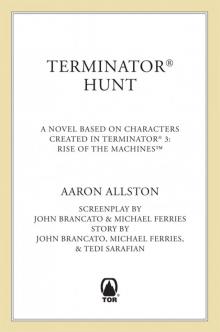 Terminator 3--Terminator Hunt
Terminator 3--Terminator Hunt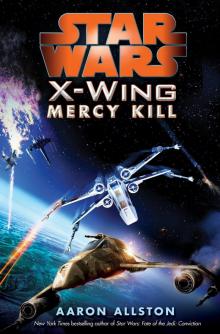 Mercy Kil
Mercy Kil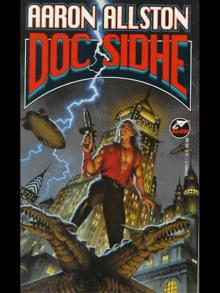 Doc Sidhe
Doc Sidhe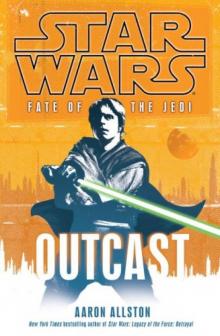 Star Wars: Fate of the Jedi: Outcast
Star Wars: Fate of the Jedi: Outcast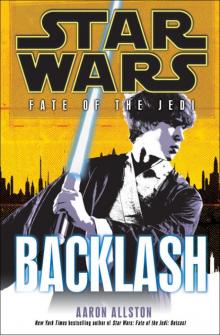 Fate of the Jedi: Backlash
Fate of the Jedi: Backlash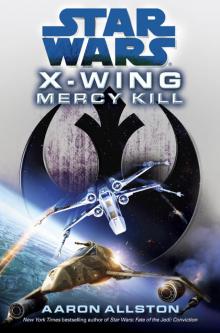 Mercy Kill
Mercy Kill Rebel Stand
Rebel Stand Wraith Squadron
Wraith Squadron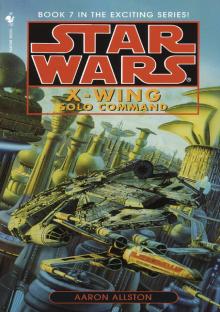 Star Wars: X-Wing VII: Solo Command
Star Wars: X-Wing VII: Solo Command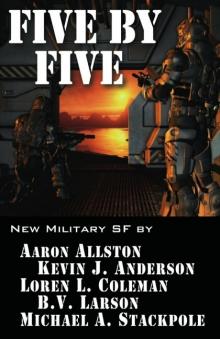 Five by Five
Five by Five Solo Command
Solo Command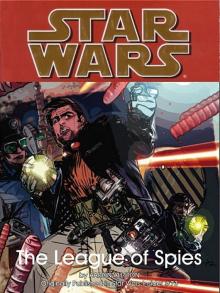 Star Wars: The Clone Wars Short Stories: The League of Spies
Star Wars: The Clone Wars Short Stories: The League of Spies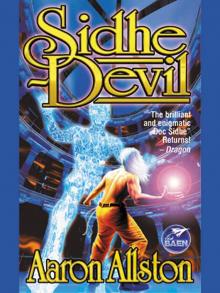 Sidhe-Devil
Sidhe-Devil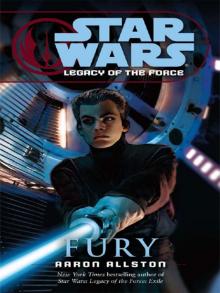 Star Wars: Legacy of the Force: Fury
Star Wars: Legacy of the Force: Fury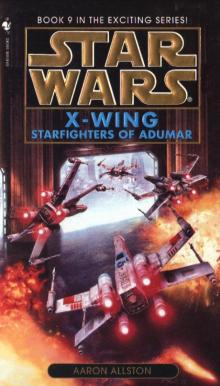 Starfighters of Adumar
Starfighters of Adumar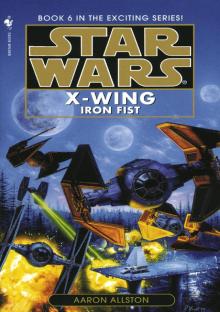 Star Wars: X-Wing VI: Iron Fist
Star Wars: X-Wing VI: Iron Fist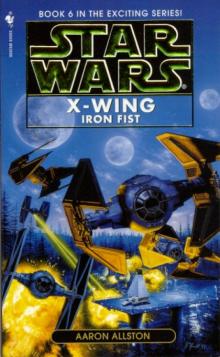 Star Wars - X-Wing - Iron Fist
Star Wars - X-Wing - Iron Fist Exile
Exile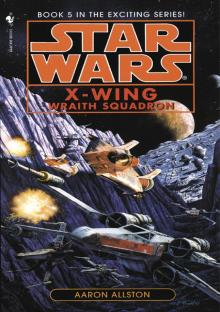 Star Wars: X-Wing V: Wraith Squadron
Star Wars: X-Wing V: Wraith Squadron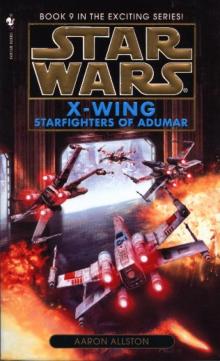 Star Wars - X-Wing - Starfighters of Adumar
Star Wars - X-Wing - Starfighters of Adumar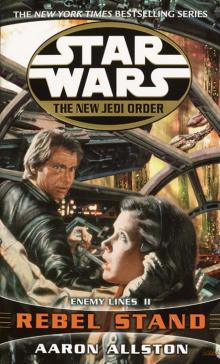 Rebel Stand: Enemy Lines II
Rebel Stand: Enemy Lines II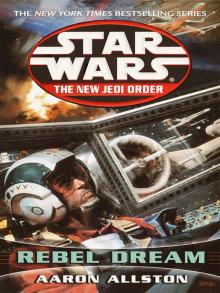 Rebel Dream: Enemy Lines I
Rebel Dream: Enemy Lines I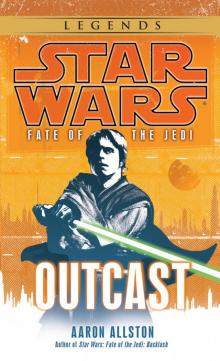 Outcast
Outcast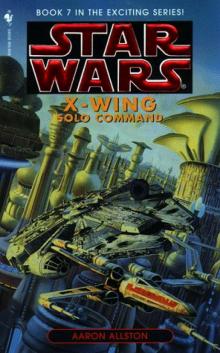 Star Wars - X-Wing 07 - Solo Command
Star Wars - X-Wing 07 - Solo Command